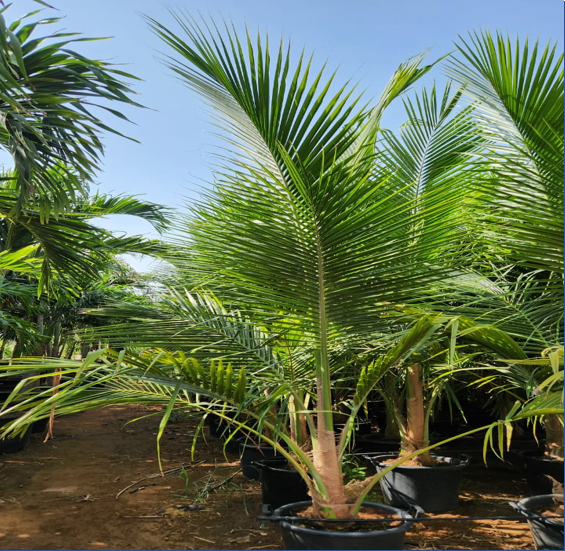The coconut palm, scientifically known as **Cocos nucifera**, is a versatile and iconic tropical tree renowned for its cultural, economic, and ecological significance. Typically reaching heights of 20 to 30 meters, it features a slender, straight trunk that is crowned with large, feathery leaves measuring 4 to 6 meters in length. These pinnate leaves are arranged in a spiraled manner, creating a striking silhouette against the sky.
Coconut palms thrive in sandy, well-drained soils, predominantly found in coastal regions of the tropics. They are highly salt-tolerant and can withstand strong winds, making them well-suited for beach environments. The tree requires full sunlight and ample moisture to flourish, taking about 6 to 10 years to start producing fruit.
The coconut itself is a drupe, consisting of three layers: the outer green husk, the fibrous mesocarp, and the hard shell encasing the edible white flesh and coconut water. These components are widely utilized in various culinary applications. Coconut water is a popular refreshing drink, while the flesh can be consumed raw, dried, or processed into coconut milk and oil, which are staples in many tropical cuisines.
Coconut palms also hold significant cultural value in many societies, symbolizing hospitality and prosperity. They are often featured in traditional ceremonies and rituals. Moreover, the tree provides valuable materials; the fibrous husk (coir) is used for making ropes and mats, while the wood is utilized in construction and furniture.
Ecologically, coconut palms play a crucial role in stabilizing coastal ecosystems. Their extensive root systems help prevent erosion and provide habitat for various wildlife. Overall, the coconut palm is a vital resource, supporting both human communities and the environment.
have a look at our outdoor plant collectionhttps://mfourgreen.com/product-category/outdoor-plants/

Reviews
There are no reviews yet.